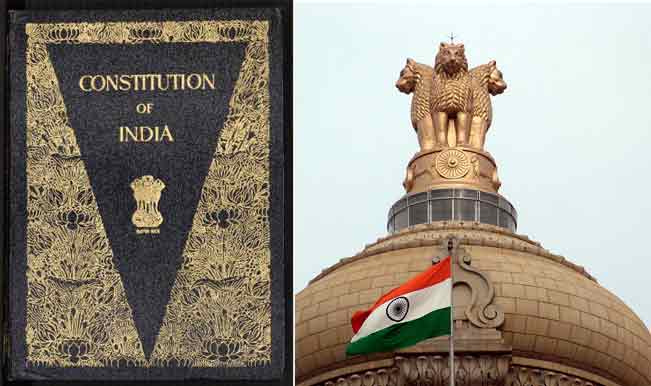
Constitutional Awareness…Freedoms: Assembly and Association
“The very idea of government, republican in form, implies a right on the part of its citizens to meet peaceably for consultation in respect of public affairs.” expressed the U.S. Supreme Court in U.S. v/s Cruikshank in 1875. It follows, therefore, that the freedom of assembly is an adjunct of and equally essential as the freedom of expression to a democratic system of government.
Our Constitution under Art,(19)(1) guarantees to all citizens of India right “to assemble peaceably and without arms.” The right assembly includes the right to hold meetings and to take out processions. This right however is subject to three limitations: viz; 1) the assembly must be peaceable,
2) it must be unarmed,
3) State may impose reasonable restrictions, deemed necessary in the interest of public order, or sovereignty or integrity of India.
The right of public meeting or of procession is not specifically guaranteed by the Constitution but will follow from the right of assembly. To some extent, there is common ground between Arts. 19(1) (a) and, 19 (1) (b). For example demonstrations, processions and meetings considered under 19(1) (a) [i.e; freedom of speech and expression] also amounts to an assembly and therefore the same principles apply under both articles.
Way back in 1973, the Supreme Court in Himmat Lal’s case has observed that, “Freedom of assembly is an essential element of any democratic system. AT the root of this concept lies the right of citizen to meet face to face with others for the discussion of their ideas and problems, religions, political, economic or social.” Where the assembly has got for its object the discussion of matters of public interest it becomes a public meeting. ‘Public meeting’ may be defined as ‘a meeting held for the purpose of discussing or expressing views on matters of public interest and which the public or any section of public is invited to attend.’ It means a meeting which is open to public or to any class or portion of public. A meeting which may be attended by any person.
The right guaranteed is however not unfettered, the State may impose certain reasonable restrictions in the interest of public order, sovereignty, and integrity of India.
If an assembly becomes unlawful it can be dispersed. The Indian Penal Code under section 141 defines, an unlawful assembly as an assembly of 5 or more persons;
1) to resist the execution of any law or legal process,
2) to commit any mischief or any criminal trespass,
3) to obtain possession of any property by force,
4) to compel a person to do what he is not legally bound to do or omit which he is legally entitled to do.
5) to overawe the government by means of criminal force or show criminal force or any public servant in the exercise of his lawful powers.
An assembly which was not unlawful when assembled may subsequently become unlawful if it became violent or is likely to result in disturbance. Such an assembly may be ordered to be dispersed if the disturbance to the public peace is reasonably apprehended. The Code of Criminal Procedure also empowers the magistrate to restrain an assembly, meeting, or procession if there is a risk of obstruction, annoyance, or injury to any person lawfully employed or danger to human life, health or safety or a disturbance of the public tranquility or a riot or an affray. The Police Act 1961 empowers an officer to direct the conduct and prescribe the route and time of all assemblies and processions in the interest of public order. Under the said Act, a member of the public desirous of taking out a procession has to obtain a prior licence.
However, the basic proposition remains that in the name of ‘regulation’ or ‘restriction’ the State cannot indirectly effectuate the ‘extinction’ of the right itself. The Supreme Court in Himmat Lal’s case referred to above, enumerated the principle thus, ”The State cannot by law take away the right of assembly by prohibiting assembly on every public street or public place. The State can only make regulations in aid of the right of assembly of each citizen.”
Art 19 (1) (c) guarantees to all citizens the right “to form association and unions and co-operative societies”. The right of association like all other rights of the citizen is derived from the principle that a man may do what he likes and therefore associate with whom he likes provided that no law is thereby broken. The rights of association and assembly consist in the liberty of two or more persons to associate or meet together, provided they do not infringe any particular rule of common law or statute. Politically the most important aspect of the right of association is the freedom to form political parties. The right of association is the very life blood of democracy. Without such a right, political parties cannot be formed, and without such parties a democratic form of government especially of the Parliamentary form cannot be rum properly. The right presupposes organization. It is an organization or permanent relationship between its members in matters of common concern. It thus includes the right to form companies, societies, partnerships, trade unions. The right guaranteed is not merely right to form association but also to continue with the association as such. It includes freedom to choose membership and a right to associate with others in pursuit of a wide variety of political, social, economic, educational, religious, and cultural ends. An individual’s freedom to speak, to worship and to petition to government for the redress of grievance could not be vigorously protected from interference by the State unless a correlative freedom to engage in group efforts towards those ends were not also guaranteed. Prima facie, the right to form associations is the greatest bulwark against power in any form. Where a single voice cannot make itself heard that of a multitude certainly can. Lord Denning, in his “Road to Justice” published in 1955, expresses thus, “If men are ever to be able to break the bonds of oppression or servitude, they must be free to meet and discuss their grievances and to work out in unison a plan of action to set things right.”
Freedom of association is considered as one of the pillars of democracy. That is why the international community gave recognition to it in Art.22 of The International Covenant on Civil and Political Rights. 1966. Art.22 of the covenant reads thus;
1) Everyone shall have the right to freedom of association with others, including the right to form and join trade union for the protection of his interest.
2) No restriction may be placed on the exercise of the rights than those whioch are prescribed by law and which are necessary in a democratic society in the interest of national security or public safety, public order, the protection of the rights and freedoms of others. This article shall not prevent the imposition of lawful restriction on members of armed forces and of police in exercise of this right.”
It thus includes the right to form an association for any lawful purpose, i.e. for the pursuit of any common interest of a group of people, having a community of interest. The word ‘form’ does not confine the right to the commencement of the association. The right includes the right of continuance of the association as well. It also includes the right that the composition shall not be so altered by law as to introduce the members other than those who voluntarily joined to form the association without the consent of members of original association.
So also, the right also implies the right to refuse to belong to any association or union if a person so desires. Art.19(1)© grants the citizen the power to choose between being a member or not being a member of an association. The Universal Declaration of Human Rights also recognizes this principle as it expressly declares that, “No one may be compelled to belong to an association.”
The term ‘co-operative society’ has been added to Art.19 (1) (c) by the 96th Constitution Amendment in the year 2013. Though the amendment was made in 2013, the Bombay high court in 1982 and the Karnataka high court in 1993, had recognized and interpreted Art.19 (1) (c) to include co-operative society as an integral part of association. In both the cases the high court’s held that the co-operative society had the sole right of enrolling the members and the officers under the co-operative societies Act, had no power to induct or enroll new members in the society.
The right of association, like other individual freedoms is not unrestricted. Art.19(4) empowers the State to impose reasonable restrictions on the right in the interest of public order, morality, or sovereignty or integrity of India.
-Adv. Madhaveshwari Thube



